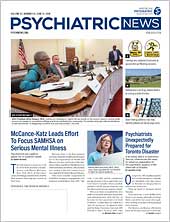On April 21, 150 Canadian psychiatrists and emergency responders attended a one-day course in Toronto on the psychiatric dimensions of disaster.
Then on April 23, disaster struck Toronto.
That morning, a man deliberately drove a van along a sidewalk on Yonge Street, one of the city’s main thoroughfares, killing 10 people and injuring at least 14 more.
The bizarre confluence affected at least one Toronto psychiatrist directly. Frank Sommers, M.D., program chair for the training course, was interviewed about the conference by six television stations early the same Monday morning, prior to the car attack. After the attack, the stations all called him back, and he offered suggestions to the public, particularly on ways to help children deal with news of the event.
Sommers and colleagues organized the course because they saw too little planning for responding to the mental health aspects of disasters. Sommers is a former president of APA’s Ontario District Branch, which collaborated with the Ontario Psychiatric Association and the University of Toronto to develop the program. Sommers has some personal experience with stressful conditions. He is a child survivor of the Holocaust and served with Canadian Forces in Afghanistan in 2007.
Speakers included Canadian experts, current and former members of APA’s Committee on the Psychiatric Dimensions of Disasters, and Sander Koyfman, M.D., the president of New York–based Disaster Psychiatry Outreach.
More than 150 people attended the course, 50 percent more than anticipated, said Sommers in an interview.
“We invited not just psychiatrists but also our collaborators in planning for disasters, like government ministries, the Red Cross, police, and fire departments,” said Sommers. About 25 representatives of those groups came to the conference, an indication of the importance they placed on the subject. Most of the attendees came from Ontario, but others came from Nova Scotia, Quebec, Alberta, and even British Columbia, on Canada’s west coast.
On April 23, Toronto psychiatrists were quickly drawn into the response to the tragedy. Sunnybrook Hospital received 10 victims, of whom two were dead on arrival. While medical and surgical care proceeded in the Emergency Department, members of the Department of Psychiatry—including students, trainees, and social workers—helped provide support for the families of victims who waited to hear what had happened to their loved ones, Ari Zaretsky, M.D., chief of the department, told Psychiatric News.
Sunnybrook is the largest trauma hospital in Canada and handles the most complex cases in the Toronto area, said Zaretsky. The staff set up a Family Information and Support Centre where relatives of victims could gather while awaiting word about their loved ones.
“Support for the families meant comfort and compassion—just being there for them,” said Zaretsky. Notifying relatives about the status of victims was delayed because the victims’ identities had to be checked and double-checked in the light of another tragedy in Canada that had occurred just two weeks earlier. In that case, two families were subjected to added distress when the identities of a dead victim and an injured survivor were mixed up following an accident in which a bus carrying a youth hockey team crashed and left 15 dead in Saskatchewan.
In addition to helping families, Zaretsky also asked the Sunnybrook psychiatry consultation/liaison team to check in with staff members around the hospital.
“I believe that we in the Department of Psychiatry have a special role to play in supporting our brothers and sisters at Sunnybrook, especially those who provided medical/surgical care or directly interacted with the families affected by yesterday’s tragedy,” he wrote in a memo to his staff. “In doing so, please remember that most people who are exposed to traumatic events recover and are resilient. Therefore, it is important not to ‘pathologize’ or overdiagnose the distress we are likely to witness in the coming days and weeks.”
Zaretsky noted that what made the incident especially troubling to all was not the scale of the trauma.
“Sunnybrook is a major trauma center, and we have days with that many injuries from auto accidents,” he said. “It wasn’t the numbers; it was the context of one human being driving over dozens of other human beings that made it more traumatic.”
For his part, Sommers hopes to expand the role of psychiatry in disaster preparation and response, perhaps by creating a new section in the Canadian Psychiatric Association.
“We need to do more training so we have the skills to go into action on short notice,” he said. ■
